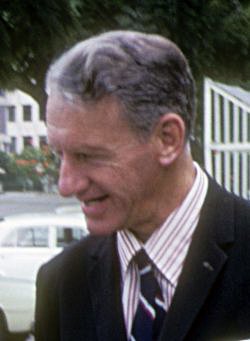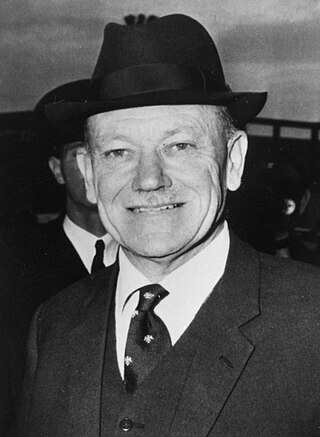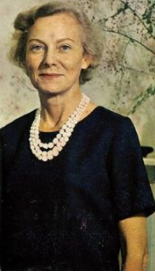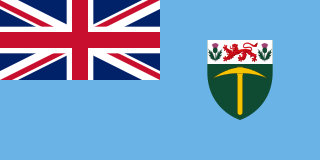Related Research Articles

Rhodesia, officially from 1970 the Republic of Rhodesia, was an unrecognised state in Southern Africa from 1965 to 1979. During this fourteen-year period, Rhodesia served as the de facto successor state to the British colony of Southern Rhodesia, and in 1980 it became modern day Zimbabwe.

Ian Douglas Smith was a Rhodesian politician, farmer, and fighter pilot who served as Prime Minister of Rhodesia from 1964 to 1979. He was the country's first leader to be born and raised in Rhodesia, and led the predominantly white government that unilaterally declared independence from the United Kingdom in November 1965 in opposition to their demands for the implementation of majority rule as a condition for independence. His 15 years in power were defined by the country's international isolation and involvement in the Rhodesian Bush War, which pitted the Rhodesian Security Forces against the Soviet- and Chinese-funded military wings of the Zimbabwe African National Union (ZANU) and Zimbabwe African People's Union (ZAPU).

Rhodesia's Unilateral Declaration of Independence (UDI) was a statement adopted by the Cabinet of Rhodesia on 11 November 1965, announcing that Rhodesia a British territory in southern Africa that had governed itself since 1923, now regarded itself as an independent sovereign state. The culmination of a protracted dispute between the British and Rhodesian governments regarding the terms under which the latter could become fully independent, it was the first unilateral break from the United Kingdom by one of its colonies since the United States Declaration of Independence in 1776. The UK, the Commonwealth, and the United Nations all deemed Rhodesia's UDI illegal, and economic sanctions, the first in the UN's history, were imposed on the breakaway colony. Amid near-complete international isolation, Rhodesia continued as an unrecognised state with the assistance of South Africa and Portugal.

Sir Roland "Roy" Welensky was a Northern Rhodesian politician and the second and last Prime Minister of the Federation of Rhodesia and Nyasaland.

The Rhodesian Bush War, also known as the Second Chimurenga, was a civil conflict from July 1964 to December 1979 in the unrecognised country of Rhodesia.
White Zimbabweans also known as White Rhodesians or simply Rhodesians are a Southern African people of European descent. In linguistic, cultural, and historical terms, these people of European ethnic origin are mostly English-speaking descendants of British settlers. A small minority are either Afrikaans-speaking descendants of Afrikaners from South Africa or those descended from Greek, Portuguese, Italian, and Jewish immigrants.

Sarah Francesca Mugabe was the first wife of Robert Mugabe and the First Lady of Zimbabwe from 1987 until her death in 1992.
During the 1960s, many independence movements emerged in countries near Rhodesia, which had significant effects on political affairs and social conditions within Rhodesia.

The Geneva Conference took place in Geneva, Switzerland during the Rhodesian Bush War. Held under British mediation, its participants were the unrecognised government of Rhodesia, led by Ian Smith, and a number of rival Rhodesian black nationalist parties: the African National Council, led by Bishop Abel Muzorewa; the Front for the Liberation of Zimbabwe, led by James Chikerema; and a joint "Patriotic Front" made up of Robert Mugabe's Zimbabwe African National Union and the Zimbabwe African People's Union led by Joshua Nkomo. The purpose of the conference was to attempt to agree on a new constitution for Rhodesia and in doing so find a way to end the Bush War raging between the government and the guerrillas commanded by Mugabe and Nkomo respectively.

The Victoria Falls Conference took place on 26 August 1975 aboard a South African Railways train halfway across the Victoria Falls Bridge on the border between the unrecognised state of Rhodesia and Zambia. It was the culmination of the "détente" policy introduced and championed by B. J. Vorster, the Prime Minister of South Africa, which was then under apartheid and was attempting to improve its relations with the Frontline States to Rhodesia's north, west and east by helping to produce a settlement in Rhodesia. The participants in the conference were a delegation led by the Rhodesian Prime Minister Ian Smith on behalf of his government, and a nationalist delegation attending under the banner of Abel Muzorewa's African National Council (UANC), which for this conference also incorporated delegates from the Zimbabwe African National Union (ZANU), the Zimbabwe African People's Union (ZAPU) and the Front for the Liberation of Zimbabwe (FROLIZI). Vorster and the Zambian President Kenneth Kaunda acted as mediators in the conference, which was held on the border in an attempt to provide a venue both sides would accept as neutral.

The modern political history of Zimbabwe starts with the arrival of white people to what was dubbed Southern Rhodesia in the 1890s. The country was initially run by an administrator appointed by the British South Africa Company. The prime ministerial role was first created in October 1923, when the country achieved responsible government, with Sir Charles Coghlan as its first Premier. The third premier, George Mitchell, renamed the post prime minister in 1933.

The Rhodesian mission in Lisbon, the capital of Portugal, operated from September 1965 to May 1975. It was a diplomatic mission representing Rhodesia, initially as a self-governing colony of Britain and, after the Unilateral Declaration of Independence in November 1965, as an unrecognised state. Rhodesia informed Britain of its intent to open a Lisbon mission headed by an accredited representative, independent from the British Embassy in the city, in June 1965. Whitehall refused to endorse the idea but Rhodesia continued nonetheless, and later that month appointed Harry Reedman to head the mission. The British government attempted unsuccessfully to block this unilateral act—Rhodesia's first—for some months afterwards.
William John Harper was a politician, general contractor and Royal Air Force fighter pilot who served as a Cabinet minister in Rhodesia from 1962 to 1968, and signed that country's Unilateral Declaration of Independence (UDI) from Britain in 1965. Born into a prominent Anglo-Indian merchant family in Calcutta, Harper was educated in India and England and joined the RAF in 1937. He served as an officer throughout the Second World War and saw action as one of "The Few" in the Battle of Britain, during which he was wounded in action. Appalled by Britain's granting of independence to India in 1947, he emigrated to Rhodesia on retiring from the Air Force two years later.

Sir Thomas Hugh William Beadle, was a Rhodesian lawyer, politician and judge who served as Chief Justice of Southern Rhodesia from March 1961 to November 1965, and as Chief Justice of Rhodesia from November 1965 until April 1977. He came to international prominence against the backdrop of Rhodesia's Unilateral Declaration of Independence (UDI) from Britain in November 1965, upon which he initially stood by the British Governor Sir Humphrey Gibbs as an adviser; he then provoked acrimony in British government circles by declaring Ian Smith's post-UDI administration legal in 1968.
Diana Mary Mitchell was a Zimbabwean political activist and writer, who was an outspoken critic of the governments of Ian Smith and Robert Mugabe.

Janet Duvenage Smith, was the wife of Ian Smith, Prime Minister of Rhodesia from 1964 to 1979. Born in Cape Town, South Africa, she studied history at the University of Cape Town and became a teacher. In 1942, she married Piet Duvenage, a rugby player, and had two children. He died in an accident on the rugby field in 1947. The next year, a short visit with family in Southern Rhodesia became permanent when she accepted a teaching job in Selukwe. There, she met her future husband, Ian Smith, who had recently come home from the Second World War. In 1948, the couple got married and bought a farm, and Ian was elected to the Southern Rhodesian Legislative Assembly.
Zimbabwean literature is literature produced by authors from Zimbabwe or in the Zimbabwean Diaspora. The tradition of literature starts with a long oral tradition, was influenced heavily by western literature during colonial rule, and acts as a form of protest to the government.

Rhodesia, was a self-governing British Crown colony in southern Africa. Until 1964, the territory was known as Southern Rhodesia, and less than a year before the name change the colony formed a part of the Federation of Rhodesia and Nyasaland and hosted its capital city, Salisbury. On 1 January 1964, the three parts of the Federation became separate colonies as they had been before the founding of the Federation on 1 August 1953. The demise of the short-lived union was seen as stemming overwhelmingly from black nationalist movements in Northern Rhodesia and Nyasaland, and both colonies were fast-tracked towards independence - Nyasaland first, as Malawi, on 6 July 1964 and Northern Rhodesia second, as Zambia, on 24 October. Southern Rhodesia, by contrast, stood firmly under white government, and its white population, which was far larger than the white populations elsewhere in the erstwhile Federation, was, in general, strongly opposed to the introduction of black majority rule. The Southern Rhodesian prime minister, Winston Field, whose government had won most of the federation's military and other assets for Southern Rhodesia, began to seek independence from the United Kingdom without introducing majority rule. However, he was unsuccessful and his own party, the Rhodesian Front, forced him to resign. Days prior to his resignation, on Field's request, Southern Rhodesia had changed its flag to a sky blue ensign defaced with the Rhodesian coat of arms, becoming the first British colony to use a sky blue ensign instead of a dark blue one.
Colin Style was a British-Zimbabwean poet and writer. He was awarded the Ingrid Jonker Prize for best published collection in English in Southern Africa, 1977 with Baobab Street (1977).
Dorothy Elizabeth "Betty" Finn, néeBorrell (1928-) was a British teacher and poet in Southern Rhodesia. She published poetry as D. E. Borrell, and other writing as D. E. Finn.
References
- 1 2 "WILSON, Daphne Merna". Who's who of Southern Africa. 1986. p. 603.
- 1 2 Style, Colin; Style, O-lan, eds. (1986). Mambo Book of Zimbabwean Verse in English. Mambo Press. p. 402. ISBN 0869223674.
- ↑ Chennells, Anthony (2008). "White Rhodesian Fiction". In Roscoe, Adrian A. (ed.). The Columbia Guide to Central African Literature in English Since 1945. Columbia University Press. pp. 77–8.
- ↑ McCracken, John (June 1997). "Terry Ranger: A Personal Appreciation". Journal of Southern African Studies. 23 (2): 176. JSTOR 2637616.
- ↑ "Annual bibliography of Commonwealth literature". The Journal of Commonwealth Literature. 13: 12. 1978.